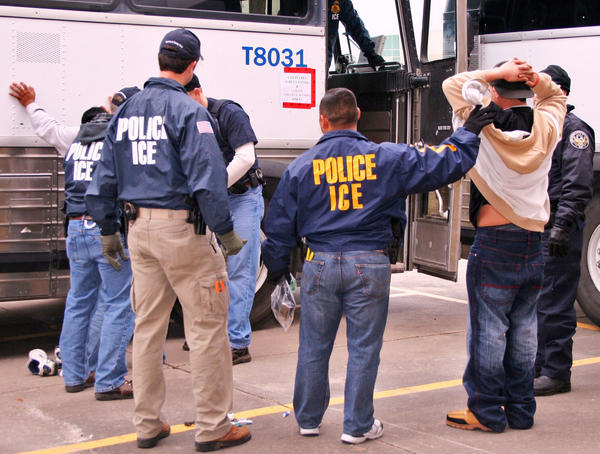 In the wake of the Obama administration’s announcement that it will postpone executive action to reform the U.S. immigration control regime until after the midterm elections, two recent articles serve as a reminder of just how dysfunctional that system is. More importantly, they demonstrate that any meaningful reform must not only change policies, but must also rein in an out-of-control bureaucracy.
In the wake of the Obama administration’s announcement that it will postpone executive action to reform the U.S. immigration control regime until after the midterm elections, two recent articles serve as a reminder of just how dysfunctional that system is. More importantly, they demonstrate that any meaningful reform must not only change policies, but must also rein in an out-of-control bureaucracy.
Crime-fighting is a central justification of the Obama administration’s immigration policing efforts. A key element in that effort has been “Secure Communities,” a program that involves the sharing of data (fingerprints and other identifying information) between local police departments and the FBI and the Department of Homeland Security (DHS). The program has contributed significantly to the identification of what are called in official parlance “criminal aliens,” and the high number of deportations carried out by DHS’s Immigration and Customs Enforcement (ICE) in recent years.
According to a just-released study by two legal scholars, Thomas Miles and Adam Cox, Secure Communities led to the federal detention of more than 250,000 (noncitizen) immigrants over the first four years of its implementation (2008-2012)—and to the deportation of about 80 % of them. What the authors call “the largest expansion of local involvement in immigration enforcement in the nation’s history” has led to the federal detention of 1.13 % of all noncitizens present in the country. (By way of comparison, about .71 % of the overall U.S. population currently endures incarceration in prisons and jails.)
Despite such numbers, Miles and Cox found that Secure Communities had “no observable effect on the overall crime rate”—including violent crime (murder, rape, arson, and aggravated assault). “This is important,” they write, “because Secure Communities specifically, and criminal deportation policies more generally, have long been publicly justified primarily on grounds that they keep communities safer from violent crime.”
Another irony is that, in carrying out these policies, as various immigrant rights advocacy organizations have documented, the federal government creates a pervasive sense of insecurity among affected communities and families. As Zoë Carpenter makes clear in a recent cover story in The Nation, New Orleans is an epicenter of such insecurity—thanks to a particular ICE initiative within its “Criminal Alien Program.”
Created in 2012 in response to Obama’s promise that the federal government would focus its deportation efforts on immigrants with criminal convictions, the Criminal Alien Removal Initiative (CARI) has taken on a particularly vicious form in New Orleans. There, reports Carpenter, the program has “morphed into an aggressive initiative characterized by coordination between ICE and local police, and the use of mobile fingerprinting devices wielded against seemingly random groups of Latino residents,” earning it among critics in Louisiana the moniker of “stop-and-frisk for Latinos.” Detentions have taken place via roving, checkpoint-like operations outside of grocery stores, laundromats, apartment buildings, and soccer games.
The “crimes” committed by many of those arrested and deported are not those typically invoked by DHS, ICE, and the White House—those involving sexual predation, murder, rape, etc.—but unauthorized entry. As Carpenter explains, the Obama administration did two things in an effort to increase the number of deportations to curry favor for electoral purposes. First, it effectively grew the number of “criminals” by formally (and increasingly) charging undocumented immigrants with illegal entry rather than simply deporting them without charges—as had been overwhelmingly the case until fairly recently. Second, the administration implemented new policing tools, CARI being a particularly ugly example.
These outcomes demonstrate both how bureaucracies need to justify themselves and how they help produce the very “problems” they are charged with addressing. “Every bureaucracy,” political scientist Christopher H. Pyle asserts, “is a solution in search of a problem, and if it can’t find a problem to fit its solution, they will redefine the problem.” In other words, bureaucracies have a tendency to insert themselves where they have not previously been. As the case of the immigrant and boundary policing apparatus in the United States suggests, this would seem to be especially true of bureaucracies charged with matters of the ever-elastic category of security.
For this reason and more, enhancing the rights and lives of immigrant families and communities requires more than reform. It necessitates a downsizing—if not the elimination—of the very policing bodies that criminalize immigrants and treat them as disposable people. Only in this way can we realize true security for all.
Joseph Nevins teaches geography at Vassar College in Poughkeepsie, New York. Among his books are Dying to Live: A Story of U.S. Immigration in an Age of Global Apartheid (City Lights/Open Media, 2008) and Operation Gatekeeper and Beyond: The War on “Illegals” and the Remaking of the U.S.-Mexico Boundary (Routledge, 2010). For more from the Border Wars blog, visit nacla.org/blog/border-wars. Follow it @NACLABorderWars.

